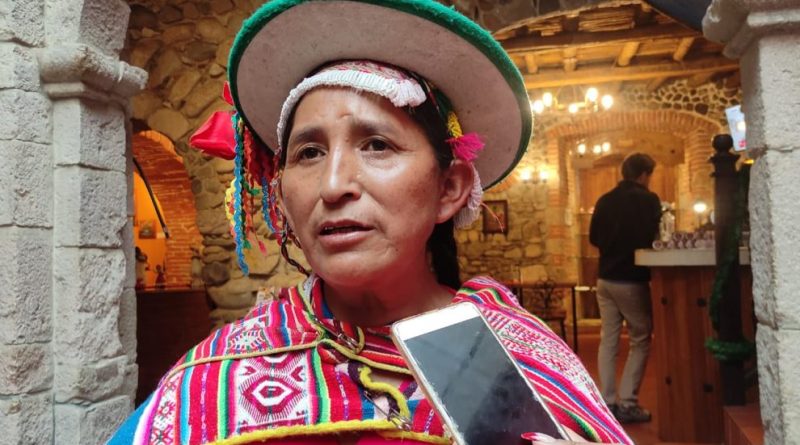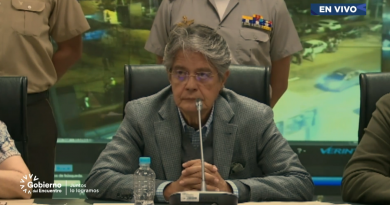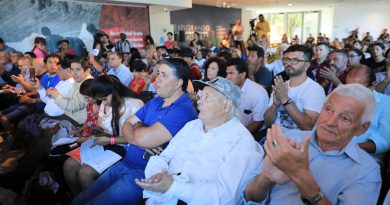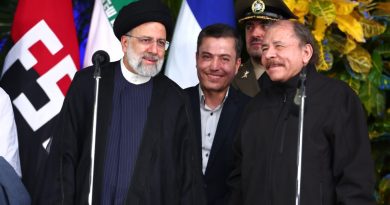Taking Down A Fascist: Interview
By Cindy Forster
Over two years ago, Lidia Patty Mullisaca of the indigenous Kallawaya nation, in rural La Paz, formally accused the leaders of Bolivia’s 2019 coup for terrorism. This lawsuit led to the recent arrest of far-right leader Fernando Camacho. No one coached her. Her decisions hold a mirror to the thinking of Bolivia’s masses. Patty was among the Movement toward Socialism (MAS) parliamentarians who fought to preserve their majority through the coup year, when the right declared fraud on spurious evidence, then violently ousted MAS President Evo Morales. According to the Constitution, she was permitted to file the criminal lawsuit only once her term had ended. She filed ten days after MAS President Luis Arce Catacora was inaugurated in a stunning grassroots victory, despite every effort of the coup authorities and their U.S., European and Latin American allies to prevent a popular electoral triumph. In her own words:
We were in our distinct regions when the coup took place. I was the first to leave my province because we met with the grassroots organizations, and they decided, “You are the representative of this province. While we defend our [vote] in the streets, you need to defend it in Parliament. Whatever it takes, you have to get back into Parliament.” I was able to re-enter, and I stayed there, while the rest were on the outside in the streets, communicating with us –they told us everything that was happening– they were being tear-gassed and arrested, they were chased, some lost their shoes, their aguayos or bundles. I chose the role of security inside Parliament. The right wanted to shut down Parliament and rule all branches of government. Since we were not in session, they wanted to force us all to resign.
MAS legislators decided we had to struggle because there was no way we could abandon the people. A power vacuum in Parliament could not be permitted. So we slept in the Assembly. No food was allowed to pass through the doors, not even water. Plaza Murillo was closed off and policed at every corner [in front of the Plurinational Assembly and National Palace]. There were tanks in the streets. Planes flew above us constantly. We wept for our people. Our people were in the streets dying, resisting the tear-gas, being seized and jailed by the police. They threatened me. They said they’d kick me out of there with their boots and then kill me. I said I didn’t care. They said they’d bomb us. I told them, I didn’t care what they did, but I wasn’t going to leave.
They didn’t physically beat us except when we were entering the building and broke through the blockade of the UTOP [the “riot” police]. The police treated us like criminals, saying if we were deputies, then show them our credentials. For five years we had been working there, and they claimed they didn’t know us. They know us very well but at that moment, they decided they had no idea who we were. We wear our polleras [Indigenous skirts] and for that reason, they were attacking us, others were defending us while the police were kicking people. Our aim was to enter the building and not let them close down Parliament.
Camacho’s objective and Murillo’s rage
For Mr. Camacho [Luis Fernando Camacho, the mastermind of the 2019 coup and current governor of the right’s bastion, Santa Cruz], the objective was to shut down the Assembly and stay in power for years and years. But he failed, and we prevailed. We were told that a recording from inside had been leaked, and they were threatening to come and sack everything, so we erased all the videos of how we had slept there in the Assembly, and how we defended ourselves. We stayed strong – and most of us were women. I don’t know why we were more women than men. At that point, on the inside, we were representatives from three departments defending the Parliament against the coup. The coup rulers wanted to govern by decree. We were the pebble in their shoe – and also the pebble in the shoe of the International Monetary Fund. We wrote petitions and reports across eleven months and resisted when they decided to shut down the schools completely [during COVID]. For the main part, it was more or less three assemblywomen who did all that.
I filed restraining orders to keep them from escaping the country and Murillo practically died from rage. He started using his people in the intelligence services to follow me. I would take three or four microbuses to get home safely. Really, we lived through terrible moments. Our role was to defend the Motherland from within Parliament because if Bolivia was still in their hands today –in the hands of the fascists– all our natural resources would have been looted, our lithium, our hydrocarbons, and our ecology destroyed. All they care about is the wealth they can extract for themselves. But we didn’t allow it. Many accuse those of us who stayed in Parliament of acting in collusion with the coup government. Our thinking was that, as one of the primary branches of government, we were able to put the brakes on many of their intentions.
Ever since we filed the lawsuit two years ago, we’ve been threatened and physically attacked. I’m doing this for the people. Some say I’ve been manipulated by brother Evo [Morales] or by our President Lucho Arce. That’s pure lies. I decided to do this with my lawyer Víctor Nina because of all we’ve lived through.
Bolivia Profunda
I’m from the Kallawaya people who live in the province of Bautista Saavedra, within the department of La Paz, where both Aymara and Quechua are spoken. My community is Niño Corin, and we are rich in art, medicine, different kinds of music. In practically all the provinces it is very beautiful to live this life. My father is Paulino Patty and my mother, Damiana Mullisaca. My father was a leader who always sought the well-being of his people. That’s how we were raised. We never chose to suffer. But malicious people in the community said “Paulino is dangerous, we have to drive him out,” because he defended the people.
My father fought for liberation from the slavery that was our reality. Even though we had the finest weaving, agricultural products, llamas, and cattle, we produced all this just so the rich could take it from us. They dominated us. That’s how we used to live. So as a young person, I dedicated myself to weaving our clothing and the aguayos (shawls with Andean designs) we carry on our backs. The tourists would come and buy pieces from us. My father never wanted us to leave for the city. He thought we would lose ourselves and fall into ruin. I convinced my father that I would be safe by going with my friend, another young woman. In the city, I worked as a domestic, for five years. The employers hardly gave us any free time to visit our families and finally I returned, to stay with my people.
Back then, we had no cellphones in the provinces, no education, no health care, and no economic help from the government. In our communities, we had nothing while in the cities they had everything. They were the ones in charge. Like [the Indigenous leader] Felipe Quispe used to say: “There are two Bolivias, those who live well in the cities and those in the countryside who have nothing.” [When a city journalist –a woman– once asked him why he had turned to armed struggle,] he said, “Because I don’t want my daughter to become your maid.” Those who had money ran everything. We had to live from what we grew in our chakras, [selling our crops] to pay for our studies, our health care. Thank God we all know a little of the Kallawaya tradition of medicine, so health was not really a problem because we know how to cure ourselves with our plants.
We needed a political instrument that belongs to the people
We understood that we needed a political instrument that belongs to the people and little by little, that project grew. With MAS, we won the confidence of the people even though others would say, “Evo is never going to win. He’s never going to be president.”
The mobilizations to protect our natural gas in 2003 inspired many more to join. The motive for our struggle became the defense of our country’s resources when President Gonzalo Sánchez de Lozada wanted to sell them off. Bolivia is so rich in everything but the right never considered creating strategic companies to serve the people. For five hundred years they’ve sacked our resources. To all those who complain of the fourteen years of MAS governance, I would say we’ve achieved economic, political, and social stability that’s reached all the provinces – every corner of the country where for five hundred years we had nothing. Our Constitution includes everyone, through the Plurinational State that includes 36 nations of original peoples. Brothers and sisters from the grassroots of our communities created that Constitution. Before, we had nothing in the way of beneficial legislation. Let’s be honest, the laws came from the United States and the ministers had to translate them to Spanish. We weren’t aware of that in the rural areas. Nothing was shared between the city and the countryside, whereas now we live as one people.
My colors are those of MAS, and I won with the little coca we grew
When I returned from the city, I had forgotten how to read and write because that ability is like a muscle, it goes slack with disuse. So I started again in 1993 and earned my middle school degree, then went into an accelerated program and completed high school in a single year. I became a teacher, of children at the primary level. Later I was the director of an institution based on Belgian financing, that created adult education centres where many, many people earned their middle-school degrees.
As women, we have to organize. For almost four years I worked with the Bartolina Sisas, always training new leaders and educating people about new laws. We were very weak politically at that point –just hand-picked for posts– and for that reason, I decided to get involved in politics and become the first councilperson. I’ve always been with MAS, and from the very beginning that’s the banner I chose. We walked from one community to the next. Sometimes I would climb into one of the vehicles of another political party and when I got off, we’d be fighting it out. They come in with lots of money to spread around gifts, and after they left, all I came with were my words. I would bring a little coca because, at that point, my brothers were beginning to plant coca, the same coca our ancestors cultivated. That little bit of coca was helpful, but the main thing is that as MAS, we come from the people.
We are organically strong for that reason. MAS is very well-structured. It’s a force. Our struggle is for the people and the political right needs to understand that. In my house, I had my pension or little restaurant, and we sold breakfast, lunch, and dinner. With that income, we funded the creation of our Political Instrument. I never made alliances with the fascists. We always had instructions from Evo that if we were defeated in elections, then we’d accept defeat, but never make a deal with the right. You have to throw yourself into this work. I eventually won the position of first councilmember.
New elections were coming, but there was always an opportunist –usually a man– waiting in the wings. At that point in time I was in the provincial leadership of the Political Instrument which many confuse with a political party, but it’s an instrument, which means it acts as the right arm of the people. The other parties wanted to ruin me politically because I was always messing up their plans. I wanted to be mayor. In the end, they let me take the position of president of the council. But like Melgarejo said [the notorious president of the 1800s], “I can’t even trust the shirt I am wearing” (“Confiar? Ni en mi camisa!”). When I became council president I had second thoughts after fighting for so long – and I went home and said to my husband, What am I going to do now? I have no idea how to be president. I began to read all the norms, and the Municipal Code, then I sought out an advisor to MAS in the city. We had no cell phones then. And he told me, whenever they attack you, declare a recess. Study the norms and laws, then continue. But they wanted to destroy me because I had denounced irregularities to the Vice Ministry of Transparency, and they accused me of stealing 30,000 bolivianos. They called an assembly, judged me, seized me, and drove me out, beating me.
My father had always taught me never to cave in if I was attacked without justification. I told them when I left, this post is mine and one day I will return to it. For that, they filed a lawsuit against me. They bought the judge. But I appealed that ruling. I lost a second time and appealed again. Years later the case ended up in Sucre [the judicial capital], and there the judge saw that the lower courts had been bribed. The court ruled that no act of corruption had occurred. I was awarded backpay for the fifteen months I should have served. That happened recently, and the people said: Lidia wasn’t guilty all along. They apologized.
Lidia Patty’s lawsuit against the coup regime
On the 4th of November [after the coup regime was voted out of power], our term as assembly members ended, and by the 18th, I filed my lawsuit against the coup leaders. We named Luis Fernando Camacho, [his father] Luis Fernando Camacho Parada [who sealed the participation of the police and armed forces – he had helped bring to power twentieth-century dictatorships], and the high command of both the military and the police. In addition, [Fernando] López, [the coup regime Minister of Defense, and Arturo] Murillo [the coup’s Minister of the Interior known to the people as the Minister of Death]. Áñez is included. We’ve added to the list. We understand that the Public Prosecutor does not act quickly, which raised the fear that the accused could escape Bolivia. Camacho was always named first in the lawsuit. We also included the victims as witnesses, among them Evo Morales, his ministers, and the Ex-Vice President [Álvaro] García Linera. By the 28th of November, we had corrected observations made by the prosecutor, and then the lawsuit was formally admitted.
I did all this as a personal decision, because of what we had lived through during the coup, what our sisters and brothers have lived through. I did not want all the deaths left in impunity. The people have said it, too, they’ve told the MAS parliamentarians of the coup year, “You’ve just walked away from it all as though you were happy about it. You haven’t denounced it or taken a single action. You haven’t even denounced the actions of the International Monetary Fund, or all that the rich robbed of our natural resources”. The regime crushed and shattered our institutions. I felt I owed a debt to my people.
When out of political office, any ordinary citizen can bring a lawsuit according to the Constitution. For killing a single person, the penalty is thirty years in prison. We are talking about thirty-eight deaths. Those who did that cannot receive a thirty-year sentence for thirty-eight deaths – no, no, each person killed by the coup regime must be individualized.
But in the street, many people are happy when they see me, they tell me, “Thank you, Lidia, for defending the Motherland.” I feel proud in that sense, that I served my people.
Question: Did you receive support from your fellow assembly members?
They were afraid. We have to ask, how did Áñez come to power? By proclaiming herself president on the 12th of November. The Assembly seemed to forget the fact that the succession of Jeanine Áñez was illegal and violated the Constitution. We’ve seen that an entire year passed from the time the lawsuit was filed before they finally took action. Impunity reigned. By the terms of their mandate, they are required to take action, but they did nothing.
I myself have been waiting for the Public Prosecutor to act. They just would not act, which leads me to believe that they were on the side of the accused. The justice system was bent over towards the other side. It was not until very recently that they took effective action to detain Fernando Camacho, the principal actor –and the intellectual author– of the crimes from three years past. [Camacho defied four summonses and even challenged the prosecutor’s office to come to arrest him on his home turf, which was done on December 28th last year. He is serving four months of preventive detention.]
The people want to see justice served for the thirty-eight deaths [of 2019], for the political prisoners, and for the injured. To this day, no one knows whether there were people who were disappeared. As progressives in struggle, we have to answer to the people. Fascists consider the interests of their families and their personal gain. The threats of the fascists against me, all that they’re doing – this will pass, everything comes to an end, nothing is eternal. I’ve told you how things unfolded, briefly, because to tell you in detail would take a very long time. Now, they’re doing all they can to sow divisions among those of us on the left, and we must not fall into that trap.
The right practices chaos: Words of professionals who admire Lidia Patty
Lawyer Aldo Michel – “In Bolivia to a terrible degree, acts of violence –acts of great perversity– have again taken place such as the setting on fire of public institutions and homes, kidnappings, tortures, [four] deaths, and other terrorist actions. In the recent past [October and November of 2022], during thirty-six days of a forced shutdown of the city of Santa Cruz, we can say that the local and regional governments exercised a reign of terror. We must not forget that functionaries of the government of Santa Cruz were directed in these actions by Fernando Camacho and Rómulo Calvo, who together with paramilitaries carried out terrorist actions in Plan 3000,” a working-class city within the metropolitan region of Santa Cruz. “This cannot be ignored.” –Aldo Michel, Bolivia TV, Noticias, Informe CIDH, “Debe contemplar nuevas violaciones a los DD.HH.” 27 enero 2023, pm news cycle
Journalist Rubén Atahuichi reported the words of Lidia Patty, filmed by another journalist, Pedro Luna – “Patty gave her opinion on the spy camera, and she says it’s all a hoax,” Atahuichi said to introduce the film clip. Patty commented, “Warm greetings –un jallalla– to all our sisters and brothers. Mr. Camacho says that a camera was placed [in his prison cell], but how can we take this seriously knowing that Camacho recorded his own political ally Mr. [Marco Antonio] Pumari, to show that Pumari was trying to destabilize our country. To save himself from [his running mate] Pumari, Camacho secretly taped Pumari then made that audio public [in which Pumari’s corruption is recorded]. The director of the penitentiary says there was nothing [in Camacho’s cell, and that Camacho’s people had minutely inspected it before he entered]. The prison authorities investigated and released a report. I think Camacho himself planted that camera so he could make that accusation. They’ve lost all dignity. That’s why I think Camacho’s people placed that camera in the cell to make excuses for themselves, to say, “Look, we are allowed no privacy.” Besides, in what penitentiary is anyone allowed privacy? For me, it’s all a show. –La Razón Radio, 2 febrero 2023, from about 1:56:20
Lawyer Víctor Nina – As part of the lawsuit’s evidence-gathering phase, “we have called for an investigation of the crime scenes in a coordinated manner” at police headquarters in Cochabamba and Santa Cruz. Patty’s lawyer Nina explained, the police guaranteed the coup. “They carried out a fundamental role.” The police forces mutinied. “Strangely, without any basis in law, without any justification,” they demanded the resignation of the president. –Bolivia TV,“ Caso Golpe de Estado I: Piden inspección técnica ocular de la UTOP de Cochabamba y Santa Cruz,” on or around 1 febrero 2023, https://www.youtube.com/watch?v=ZS4yuFFixz4
For more news and analysis, check out our podcast Latin America Review: https://linktr.ee/latinamericareview
By Kawsachun News



